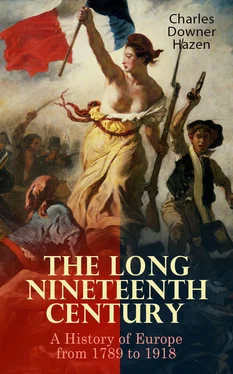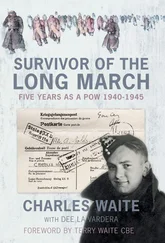The contest between these two parties grew shriller and more vehement every day, ending in a life and death struggle. It began directly after the meeting of the Convention, in the discussion as to what should be done with Louis XVI, now that monarchy was abolished and the monarch a prisoner of state.
The King had unquestionably been disloyal to the Revolution. He had given encouragement to the emigres and had entered into the hostile plans of the enemies of France. After the meeting of the Convention a secret iron box, fashioned by his own hand, had been discovered in the Tuileries containing documents which proved beyond question his treason. Ought he to have the full punishment of a traitor or had he been already sufficiently punished, by the repeated indignities to which he had been subjected, by imprisonment, and by the loss of his throne? Might not the Convention stay its hand, refrain from exacting the full measure of satisfaction from one so sorely visited and for whom so many excuses lay in the general goodness of his character and in the extraordinary perplexities of his position, perplexities which might have baffled a far wiser person, at a time when the men of clearest vision saw events as through a glass, darkly? But mercy was not in the hearts of men, particularly of the Jacobins, who considered Louis the chief culprit and unworthy of consideration. The Jacobins at first would not hear even of a trial. Robespierre demanded that the King be executed forthwith by a mere vote of the Convention, and Saint-Just, a satellite of Robespierre, recalled that "Caesar was despatched in the very presence of the Senate without other formality than twenty-two dagger strokes." But Louis was given a trial, a trial, however, before a packed jury, which had already shown its hatred of him, before men who were at the same time his accusers and his judges. The trial lasted over a month, Louis himself appearing at the bar, answering the thirty-three questions which were put to him and which covered his conduct during the Revolution. His statements were considered unsatisfactory. Despite the eloquent defense of his lawyer the Convention voted on January 15, 1793, that "Louis Capet" was "guilty of conspiracy against the liberty of the Nation and of a criminal attack upon the safety of the state." The vote was unanimous, a few abstaining from voting but not one voting in the negative. Many of the Girondists then urged that the sentence be submitted to the people for their final action. Robespierre combated this idea with vigor, evidently fearing that the people would not go the whole length. This proposition was voted down by 424 votes against 283.
What should be the punishment? Voting on this question began at eight o'clock in the evening of January 16, 1793. During twenty-four hours the 721 deputies present mounted the platform one after the other, and announced their votes to the Convention. At eight o'clock on the evening of the 16th the vote was completed. The president announced the result. Number voting 721; a majority 361. For death 387; against death, or for delay 334.
On Sunday, January 21, the guillotine was raised in the square fronting the Tuileries. At ten o'clock Louis mounted the fatal step with courage and composure. He was greater on the scaffold than he had been upon the throne. He endeavored to speak. "Gentlemen, I am innocent of that of which I am accused. May my blood assure the happiness of the French." His voice was drowned by a roll of drums. He died with all the serenity of a profoundly religious man.
The immediate consequence of the execution was a formidable increase in the number of enemies France must conquer if she was to live, and an intensification of the passions involved. France was at war with Austria and Prussia. Now England, Russia, Spain, Holland, and the states of Germany and Italy entered the war against her, justifying themselves by the "murder of the King," although all had motives much more practical than this sentimental one. It was an excellent opportunity to gain territory from a country which was plainly in process of dissolution. Civil war, too, was added to the turmoil, as the peasants of the Vendee, 100,000 strong, rose against the Republic which was the murderer of the king and the persecutor of the church. Dumouriez, an able commander of one of the French armies, was plotting against the Convention and was shortly to go over to the enemy, a traitor to his country.
The ground was giving way everywhere. The Convention stiffened for the fray, resolved to do or die, or both, if necessary. No government was ever more energetic or more dauntless. It voted to raise 300,000 troops immediately. It created a Committee of General Security, a Committee of Public Safety, a Revolutionary Tribunal, all parts of a machine that was intended strong to concentrate the full force of the nation upon the problem of national salvation and the annihilation of the republic's enemies, whether foreign or domestic.
But while it was doing all this the Convention was floundering in the bog of angry party politics. Discussion was beginning its work of dividing the republicans, preparatory to consuming them. The first struggle was between the Girondists and the Jacobins. The Girondists wished to punish the men who had been responsible for the September Massacres. They wished to punish the Commune for numerous illegal acts. They hated Marat and were able to get a vote from the Convention sending him before the Revolutionary Tribunal, expecting that this would be the end of him.
Instead, he was acquitted and became the hero of the populace of Paris, more powerful than before and now wilder than ever in his denunciations. Sanguinary Marat, feline Robespierre, were resolved on the annihilation of the Girondists. Danton thinking of France and loathing all this discord, when destruction the nation was in danger, all this exaggeration of self, this contemptible carnival of intrigue, thinking that Frenchmen had enemies enough to fight without tearing each other to pieces, tried to play the peacemaker. But he had the fate that peacemakers frequently have. He accomplished nothing for France and made enemies for himself.
The Commune, which supported the Jacobins, and which idolized Marat and respected Robespierre, intervened in this struggle, using, to cut it short, its customary weapon, physical force. It organized an insurrection against the Girondists, a veritable army of 80,000 men with sixty cannon. Marat, himself a member of the Convention, climbed to the belfry of the City Hall and with his own hand sounded the tocsin. This was Marat's day. He, self-styled Friend of the People, was the leader of this movement from the beginning to the end of the fateful June 2, 1793. The Tuileries, where the Convention sat, was surrounded by the insurrectionary troops. The Convention was the prisoner of the Commune, the Government of France at the mercy of the Government of Paris. The Commune demanded the expulsion of the Girondist leaders from the Convention. The Convention protested indignantly against the conduct of the insurgents. Its members resolved to leave the hall in a body. They were received with mock deference by the insurgents. The demand of then-president that the troops disperse was bluntly refused until the Girondists who had been denounced should be expelled. The Convention was obliged to return to its hall conquered and degraded and to vote the arrest of twenty-nine Girondists. For the first time in the Revolution the assembly elected by the voters of France was mutilated. Violence had laid its hand upon the sovereignty of the people in the interest of the rule of a faction. The victory of the Commune was the victory of the Jacobins, who, by this treason to the nation, were masters of the Convention.
But they were not yet masters of the country. Indeed this high-handed crime of June 2 aroused indignation and resistance throughout a large section of France. Had the departments no rights which the Commune of Paris was bound to respect? The Girondists called the departments to arms against this tyrannical crew. They responded with alacrity, exasperated and alarmed. Four of the largest cities of France, Lyons, Marseilles, Bordeaux, and Caen, took up arms, and civil war, born of politics, added to the civil war born of religion in the Vendee, and to the ubiquitous foreign war, made confusion worse confounded. In all some sixty departments out of with eighty-three participated in this movement, three-fourths of France. To meet this danger, to allay this strong distrust of Paris felt by the departments, to show them that they need not fear the dictatorship of the Commune, the Convention drafted in great haste the constitution which it had been summoned to make, but which it had for months ignored in the heat of party politics. And the Constitution of 1793, the second in the history of the Revolution, guarded so carefully the rights of the departments and the rights of the people that it made Parisian dictation impossible.
Читать дальше












